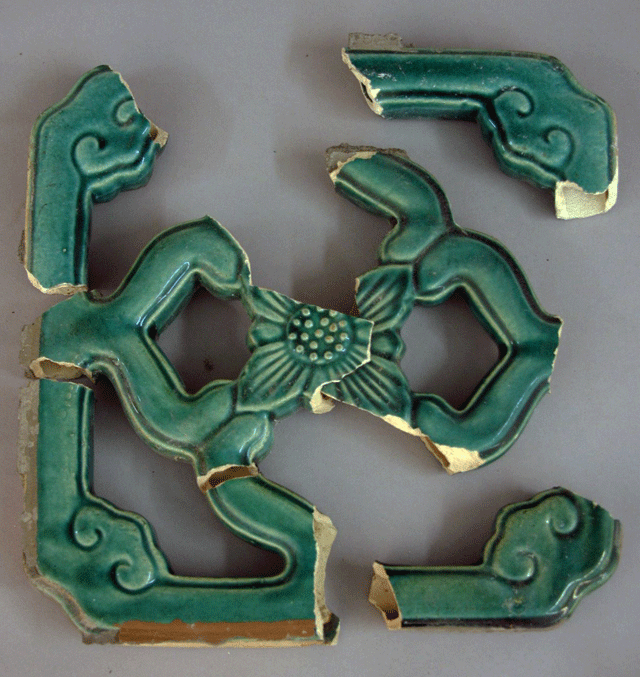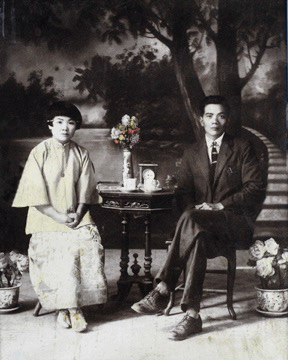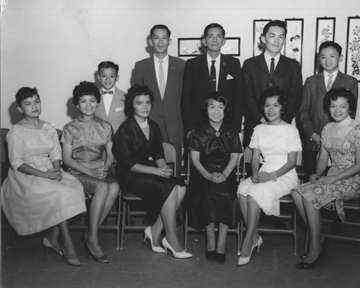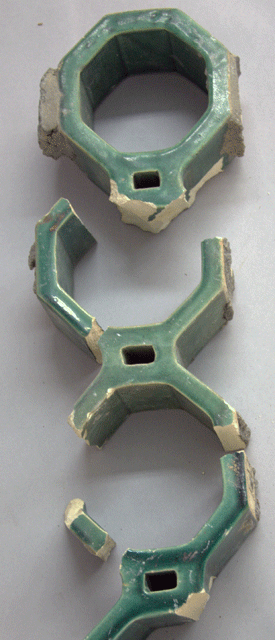
Decorative tile fragments from the New Chinatown restaurant.

Decorative tile fragments from the
New Chinatown restaurant.
Mr. Kim Ong writes:
I grew up in what I proudly claim to be Albuquerque's "first Chinese-American nuclear family," which included my mother, my father, my five sisters and three brothers, and me. I am the third of nine children, all born in Albuquerque.
 My father, Wing Ong, and my mother, Wong Lin Ong, settled in Albuquerque, New
Mexico in February 1929, soon after their marriage in their native
Guangdong Province
in southern China. They arrived in the U.S. via steamship in December 1928
and were processed through the
Angel Island
immigration center in San Francisco Bay. Fortunately, they moved through the
immigration process smoothly, because my father had come to the U.S. earlier
to work in the butcher shop of his half-brother's
Fremont Grocery Company
store. (This grocery operation was started in 1918 by my father's relatives and
his half-brother.) My father's father and his grandfather had come to the
U.S. even earlier, and had crossed the Pacific Ocean several times to visit
their families. I was told by my father that his father worked as a domestic
servant in California's Sacramento Valley and that his grandfather worked on
railroads in Colorado and was killed in a dynamite accident.
My father, Wing Ong, and my mother, Wong Lin Ong, settled in Albuquerque, New
Mexico in February 1929, soon after their marriage in their native
Guangdong Province
in southern China. They arrived in the U.S. via steamship in December 1928
and were processed through the
Angel Island
immigration center in San Francisco Bay. Fortunately, they moved through the
immigration process smoothly, because my father had come to the U.S. earlier
to work in the butcher shop of his half-brother's
Fremont Grocery Company
store. (This grocery operation was started in 1918 by my father's relatives and
his half-brother.) My father's father and his grandfather had come to the
U.S. even earlier, and had crossed the Pacific Ocean several times to visit
their families. I was told by my father that his father worked as a domestic
servant in California's Sacramento Valley and that his grandfather worked on
railroads in Colorado and was killed in a dynamite accident.
My mother pawned her wedding trousseau to start a small grocery store in the predominantly Hispanic Barelas neighborhood. With my father, she also owned a second grocery store nearby, thus providing for a growing family during the Great Depression. They extended credit to poor customers, thereby earning both respect and friendship in the neighborhood. They learned to speak a little Spanish from their customers. At home they spoke Cantonese to us, but my siblings and I never learned enough Chinese to speak it fluently. We were taught English at the neighborhood's Coronado Grade School, and it quickly became our first language.
I was in grade school when the U.S. entered World War II against Germany and Japan. The entire country was very patriotic, and everyone rallied to help defeat our enemies. Chinese-Americans were especially grateful to the U.S. for helping drive the Japanese military out of mainland China. In 1945 the end of World War II led to huge celebrations in Albuquerque.
My father went into the restaurant business during World War II and was part owner of the ChungKing Cafe (next door to Fremont Grocery Store, at 618 Central Avenue). He then went into business for himself, owning the U and I Cafe on 4th Street across from the U.S. Post Office building. Albuquerque boomed during the war years because of the large military presence where Kirtland Air Force Base is now located. My parents' businesses were part of the city's economic success, and they invested in private and commercial real estate. After World War II they were co-owners of the New Chinatown Restaurant on East Central Avenue.
My siblings and I helped with the family businesses while attending school. We found time to participate in school activities such as sports, the school newspapers, and student politics. I was elected president of my sophomore, junior, and senior classes at Albuquerque High School. Several of my sisters and brothers also were elected to class offices. Our ability to obtain a good education and participate in social activities is a reflection of Albuquerque's progressive environment—where people of different races and cultures are mostly accepted. Prejudice and intolerance do exist but not as acutely in Albuquerque as in some other parts of the U.S.
My father developed many business friends and was asked to join the Masons and Shriners. He was a very active member of both.
In 1998 my mother was honored with the New Mexico Women's Foundation BUDDY (Bringing Up Women Differently) Award. The award was given to women who set good examples for their daughters in overcoming obstacles such as poverty, gender discrimination, and racial prejudice to lead successful lives.
My parents taught their children to be proud of their Chinese heritage, to
be obedient at home, to work before play, to be thrifty, to study hard, to
be respectful of other people, and to be law-abiding citizens. We are all
thankful for the opportunity to practice these values in raising our own
families and to contribute to the growth and success of Albuquerque and
the rest of the nation.

The Ong family poses during Mr. Wing Ong's 60th
birthday celebration in 1960. For a few more
photos of the Ong family, please click
here.
My siblings and I worked in the following vocations and professions:
David Ong (b. 1929) was an aerospace engineer with Martin Marietta in Colorado, from 1960 to 1995.
Jean Ong Jew (b. 1931) raised three sons and was a co-owner (with her husband Harry Jew and father Wing Ong) of the New Chinatown Restaurant between 1950 and 2005.
Kim Ong (b. 1932) is me! From 1958 to 1996 I was a water quality hydrologist with the U.S. Geological Survey's New Mexico District Office.
 Mou Kiet (Kitty) Ong (b. 1934) raised two daughters and
assisted in the operation and management of several family restaurants
(including the U and I Cafe, the Chinese Village Restaurant, and the New
Chinatown Restaurant) between 1955 and 2005.
Mou Kiet (Kitty) Ong (b. 1934) raised two daughters and
assisted in the operation and management of several family restaurants
(including the U and I Cafe, the Chinese Village Restaurant, and the New
Chinatown Restaurant) between 1955 and 2005.
Jane Ong Baker (b. 1936) raised two daughters and owned or managed family businesses (such as the Tiki-Kai Night Club, the Tiki Bar, and the Polynesian Lounge in the New Chinatown Restaurant) between 1960 and 2005.
Tane Ong Chan (b. 1938) raised two daughters and a son and owned several gift shops. One is the very popular Wok Shop in San Francisco's Chinatown, open since 1962.
Anna Mae Ong Doon (1943–1986) raised two daughters and worked as a public school teacher and social worker in San Francisco between 1962 and 1986.
Richard Ong (b. 1944) worked as a real estate manager and builder for the Coda Roberston Company. Since 1970 he has been director of Laguna Pueblo's Housing Authority.
Randolph Ong (b. 1949) formerly owned a print shop but since 1972 he has been the assistant manager of the Wok Shop in San Francisco's Chinatown.
My father (1900–1982) and mother (1906–2005) were very proud of their Chinese-American family of mixed heritage. Their legacy is carried on by grandchildren and great-grandchildren whose careers include finance, teaching, law, music, photography, healthcare, information technology, and national defense.
After the New Chinatown was razed, but before the debris was hauled away, Mr. Ong rescued a sample of the decorative tiles from the restaurant. According to family lore, the tiles had come from China. A few of the fragments are shown on this page. (Photos by L. Natker.)
See source code for photo credits and copyright information. Page last revised on August 12, 2015. Please report problems to toh@unm.edu